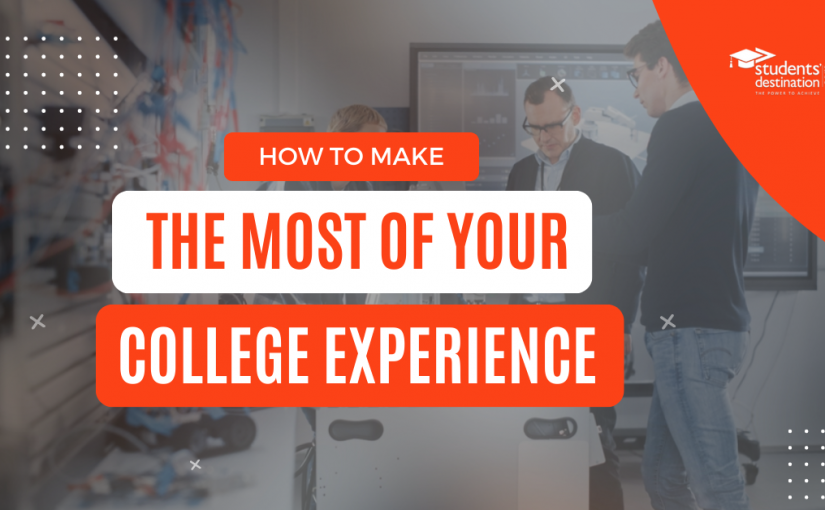Author: admin1
Career Prep 101: How to Make the Most of Your College Experience
For many students, college is a time of exploration, self-discovery, and personal growth. However, it’s also an important time to lay the foundation for a successful career. With the right mindset and approach, you can make the most of your college years and set yourself up for future success. In this blog, we’ll explore some strategies for maximizing your college experience for career preparation.
Explore Your Interests and Passions
Before you can prepare for a career, you need to have a sense of what you’re interested in and passionate about. Use your college years as a time to explore your interests and try new things. Take a variety of courses, join clubs and organizations, and seek out internships or part-time jobs in fields that intrigue you. This exploration can help you identify your strengths and interests and guide you toward potential career paths.
Build a Strong Network
Networking is a crucial part of career preparation, and college is an excellent place to start building your professional network. Attend career fairs, job-shadowing events, and other career-related activities on campus. Connect with alumni and professors in your field of interest, and seek out mentors who can offer guidance and support. Networking can help you learn about job opportunities, gain valuable insights into your chosen field, and make meaningful connections that can benefit you throughout your career.
Get Involved in Research
Many colleges offer research opportunities for undergraduate students, which can be a great way to gain hands-on experience and develop skills that are in high demand in many fields. Research can help you develop critical thinking and problem-solving skills, as well as enhance your communication and teamwork abilities. Additionally, research experience can be a valuable addition to your resume when applying for jobs or graduate programs.
Seek Out Internships and Co-Op Programs
Internships and co-op programs can provide valuable real-world experience and help you build connections in your chosen field. Look for opportunities to intern or work part-time in your field of interest, whether through your college’s career center or by networking with professionals in the industry. Internships and co-ops can help you gain hands-on experience, develop professional skills, and make meaningful connections that can lead to job opportunities after graduation.
Develop Transferable Skills
While technical skills and knowledge are important, many employers also value soft skills, such as communication, teamwork, and problem-solving abilities. Use your college years to develop these transferable skills by taking on leadership roles in clubs and organizations, participating in team projects, and seeking out opportunities to work with diverse groups of people. These skills can help you stand out in the job market and succeed in a variety of fields.
Take Advantage of Career Services
Most colleges offer career services to help students prepare for the job market. Take advantage of these resources, which may include resume and cover letter review, job search assistance, and interview preparation. Additionally, many career services offices offer workshops and events to help students develop job-searching skills and explore career options.
Stay Up-to-Date on Industry Trends
Finally, it’s important to stay current with trends and developments in your chosen field. Read industry publications, attend conferences and seminars, and participate in online forums and discussions related to your field. This can help you stay informed about new opportunities and challenges, as well as develop a deeper understanding of your chosen profession.
College can be an excellent time to prepare for your future career. By exploring your interests and passions, building a strong network, seeking out research and internship opportunities, developing transferable skills, taking advantage of career services, and staying up-to-date on industry trends, you can make the most of your college years and set yourself up for success in the years to come.
Setting Yourself Up for Success: Top 10 Career Options for Students in 2023
As we move into 2023, the job market continues to evolve and adapt to new technological advancements, changing demographics, and shifting global trends. For students looking to make informed decisions about their future careers, it’s important to stay up-to-date with the latest trends and opportunities. In this article, we’ll explore the top 10 career options for students in 2023.
- Data Analyst: With the increasing importance of data in decision-making processes across industries, data analysts are in high demand. They collect, analyze, and interpret data to help organizations make informed decisions.
- Software Developer: As technology continues to advance, software developers are needed to design, develop, and maintain software programs and applications.
- Healthcare Professional: With an aging population and increasing demand for healthcare services, healthcare professionals such as nurses, doctors, and therapists are in high demand.
- Cybersecurity Specialist: As cyber threats continue to evolve, cybersecurity specialists are needed to protect organizations from cyber attacks and ensure the safety and security of their data.
- Environmental Scientist: As climate change and environmental concerns become more pressing, environmental scientists are needed to study, monitor, and address environmental issues.
- Marketing Manager: With the increasing importance of branding and digital marketing, marketing managers are needed to develop and execute marketing strategies that promote products and services.
- Financial Analyst: As businesses continue to navigate complex financial markets, financial analysts are needed to help organizations make informed decisions about their investments and financial strategies.
- Human Resources Manager: As the job market becomes more competitive, human resources managers are needed to attract, develop, and retain top talent for organizations.
- Artificial Intelligence Specialist: With the increasing importance of automation and machine learning, artificial intelligence specialists are needed to design and develop AI systems and applications.
- Renewable Energy Specialist: With the growing demand for sustainable energy sources, renewable energy specialists are needed to design, develop, and implement renewable energy technologies.
By exploring these sought-after career options, students can gain a better understanding of the job market and identify potential career paths that align with their skills, interests, and career goals. It’s important to remember that the job market is constantly changing, so it’s essential to stay up-to-date with the latest trends and opportunities and be willing to adapt and learn as you navigate your career path.
Building Your Future: 16 Career Planning Strategies Every Student Should Know
Career planning is an important process that can help students to make informed decisions about their future careers. Whether you’re just starting your college journey or preparing to enter the workforce, developing a career plan can help you to identify your strengths, set goals, and make the most of your skills and experience. In this blog, we’ll explore 16 essential career planning strategies that can help you to build a successful career.
- Start Early: Begin thinking about your career goals and aspirations as early as possible, and start taking steps to achieve them.
- Explore Your Options: Research different career paths and explore your interests to identify potential career paths.
- Set Realistic Goals: Develop achievable goals that align with your interests and abilities.
- Develop a Career Plan: Create a roadmap that outlines the steps you need to take to achieve your career goals.
- Assess Your Skills: Identify your strengths and areas for improvement to help you focus your career development efforts.
- Gain Experience: Seek out internships, volunteer opportunities, and part-time work to gain valuable experience in your field.
- Build Your Network: Connect with professionals in your field and build a network that can help you to access job opportunities and gain valuable insights.
- Attend Industry Events: Attend conferences, workshops, and other industry events to stay up-to-date with industry trends and advancements.
- Seek Mentorship: Mentorship can be a valuable resource in career planning. Seek out mentors who can offer guidance and support, and provide you with insights into the industry and career path you’re interested in pursuing..
- Invest in Professional Development: Take courses, certifications, and other training opportunities to develop your skills and knowledge.
- Create A Strong Resume & Cover Letter: A strong resume and cover letter are crucial in career planning. Tailor your resume and cover letter to the specific job you’re applying for, and highlight your relevant skills and experience.
- Practice Interview Skills: Practice your interview skills and be prepared to talk about your skills and experience.
- Conduct Salary Research: Research salary ranges for your desired career path to ensure that you’re being fairly compensated.
- Develop a Personal Brand: Develop a strong personal brand that highlights your skills, experience, and unique qualities.
- Use Social Media: Use social media to showcase your professional experience and build your network.
- Seek Feedback: Seek feedback from colleagues, mentors, and others to help you identify areas for improvement and make informed decisions about your career development.
By following these 16 essential career planning strategies, you can develop a strong career plan and build the skills and experience you need to succeed in your chosen field. Remember that building a successful career takes time and effort, so be patient, persistent, and willing to learn as you work towards your goals.
Online Degrees: The New Gamechanger For Your Future Career
Online education has revolutionized the way we learn and has made higher education more accessible to people from all walks of life. The flexibility, affordability, and convenience of online education have made it an increasingly popular choice for students. And, if you’re wondering if an online degree can help you land your dream career, the answer is a resounding yes!
Here are some ways an online degree can boost your chances of a dream career:
Access to more career options: Online education offers a wider range of courses and programs than traditional universities. You can study a variety of subjects, from business management to nursing, from anywhere in the world. With more options to choose from, you can specialize in the field that you’re passionate about and build a career that aligns with your interests.
Convenience and flexibility: One of the biggest advantages of online education is its flexibility. You can study at your own pace and complete coursework on your own schedule. This means you can balance your education with work, family, or other commitments, which is especially important for non-traditional students. You can also study from anywhere with an internet connection, which makes it easier to pursue a degree while traveling or living abroad.
Improved technical skills: Online education requires students to use various digital tools and platforms, which helps them develop valuable technical skills. These skills are highly sought after in today’s job market, where many employers are looking for candidates who are tech-savvy and can adapt to new technologies quickly. By completing an online degree, you’ll be able to demonstrate your proficiency in digital tools, which can give you a competitive edge in your job search.
Cost savings: Online education is often more affordable than traditional university programs. With no commuting costs, housing expenses, or on-campus fees, online degrees can be significantly cheaper. This means you can complete a degree without accumulating a large amount of debt, which can give you greater financial stability as you pursue your dream career.
Access to a wider job market: Online education allows you to connect with students and faculty from all over the world. This can expand your professional network and give you access to a wider job market. You can also take advantage of online job boards and career resources to find job opportunities that match your skills and interests.
In a nutshell, an online degree can open doors to your dream career by offering you access to more career options, flexibility, technical skills, cost savings, and a wider job market. By completing an online degree, you can demonstrate your dedication to learning and your ability to balance multiple commitments, which are highly valued by employers. So, don’t hesitate to explore online education as a path to your dream career.
Right Career Guidance At The Right Time Is The Way To Shine
It has been long established that career guidance for students is the need of the hour. A continuously evolving world rife with uncertainties & the rising adoption of AI & digital mechanisms in every sphere have leveraged its importance more than before. However, as much as we address this aspect, what often remains undiscussed is the ideal time when students should consider beginning their journey to get credible & comprehensive advice on exploring career options suited to their skills.
Having a solid idea of when to begin the process of getting career guidance and counselling determines the pace & time of its effectiveness. Delaying taking the first step when the time is right largely reduces the likelihood of getting the best results while starting too early may cause heightened stress in students. So the question that looms large is, “When is it a good idea to discuss & a roadmap to choosing the right career?”
Data has revealed that by the time students are in middle school, they develop sufficient emotional & cognitive intelligence to start looking at & understanding all the information about available options. Though, it may not be realistic to expect them to rapidly take a final call at this early juncture.
However, it is a great time to help them find out what their strengths and weaknesses are and the choices they have in front of them which would fit the bill.
Figuring Out Your Areas Of Strength
Making a career choice is not a decision made on the spur of the moment on a whim. It is generally a time-consuming process & can be a long road to find a job that is satisfying. There are multiple factors that come into play during this journey which include a student’s aptitude, interests and mindset. However, the question is what if a student isn’t familiar with these aspects?
This is a concern that is quite common & one of the reasons why the first step in the career counselling journey begins with building awareness about a student’s own abilities and personality through Psychometric Tests. These are scientifically designed tests to assess their persona, activities for which they have a natural inclination & the beliefs that shape their decision making.
Potential Of AI-Powered Career Counselling
The use of AI-powered career counselling and tech-enabled psychometry can be a great way to get career guidance that is tailored to each individual’s needs. These tools can help individuals identify their strengths, weaknesses, and opportunities so they can make the best choices for their future.
By using these AI-powered tools, individuals can get accurate and detailed advice on how to pursue their desired career paths. This will not only allow them to reach their goals faster but also give them the confidence they need to succeed in life.
For instance, we have developed a pioneering AI-driven assessment system enabling a student explore the spectrum of options customised according to their interests, aptitude & mindset.
Since the assessment of Student A will always be different from Student B, the spectrum of options for them will be suited to their persona. This ensures that instead of traditional choices, they are able to choose from a diverse range of career options that are in sync with their passion. As a result, it becomes an extension of an activity they love to indulge in instead of a way to make a living.
To sum it up, it goes without saying that early birds will always catch the worm when it comes to career guidance. So, start scoping out a career counselling expert today & begin the journey.






